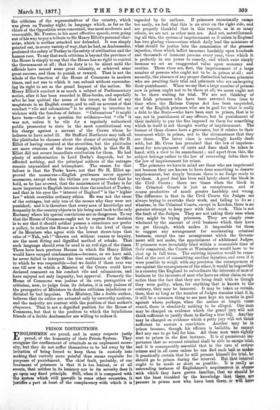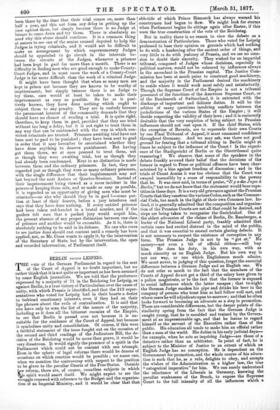PRISON DISTINCTIONS.
UNGT,IISHMEN are proud, and in many respects justly, prowl, of the humanity of their Prison System. They recognise the confinement of criminals as an unpleasant neces- sity, but they do not suffer themselves to be led away by the irritation, of being forced to keep them in custody into making that custody more painful than seems requisite for purposes of punishment. The chief fault, probably, of owl treatment of prisoners is that it is too lenient, or at all events,. that neither in its leniency nor in its severity does it go upon any fixed principle. Still, when it is compared with the system which, still prevails in some other countries, it justifies a part at least of- the complacency with which it is regarded by its authors. If prisoners occasionally escape too easily, we feel that this is an error on the right side, and are properly thankful that in this respect, as in so many others, we are not as other men are. And yet, notwithstand ... ing all this, the system of imprisonment as it exists in England has two glaring vices—vices which daily lead the ministers of what should be justice into the commission of the grossest injustice, vices which inflict immense hardship upon hundreds and thousands of innocent persons every year, vices which it is perfectly in our power to remedy, and which exist simply because we set an exaggerated value upon economy and routine. These vices are, first, the imprisonment of a large number of persons who ought not to be in prison at all ; and secondly, the absence of any proper distinction between prisoners who are awaiting their trial and prisoners who are undergoing their punishment. When we say that a large number of persons now in prison ought not to be there at all, we mean ought not to be there waiting for trial. We are not thinking of the Irish prisoners who have been arrested from time to time when the Habeas Corpus Act has been suspended, or of the English prisoners who are in gaol for what is really a debt to the State—who have been sent to prison, that is to say, not in punishment of any offence, but in puniahment of their inability to pay the fine imposed on them for something which in itself is not thought worthy of imprisonment. The former of these classes have a grievance, but it relates to their treatment while in prison, not to the circumstance that they are there. The latter class is exceedingly hardly dealt with, but Mr. Cross has promised that the law of imprison- ment for non-payment of costs and fines shall be taken in hand, with a view to its amendment ; and apart from this, the subject belongs rather to the law of recovering debts than to the law of imprisonment for crime. The prisoners we have in mind are those who are imprisoned not because they are known to have done something to deserve imprisonment, but simply because there is no Judge ready to try them. A good deal has been said lately about the block in the Civil Courts ; there are times when the block in the Criminal Courts is just as conspicuous, and of course productive of much greater hardship and wrong. The difference is that in the Civil Courts the Judges are always trying to overtake their work, and failing to de so ; whereas, in the Criminal Courts, except in London, there is no genuine attempt to keep pace with their work. This is not the fault of the Judges. They are not taking their ease when they might be trying prisoners. They are simply over- whelmed by the amount of civil business which they have to get through, which makes it impossible for them to suggest any arrangement for accelerating criminal business, except the one arrangement which the Govern,- ment will not make, the appointment of additional Judges. If prisoners were invariably tried within a reasonable time of their committal, the Courts at Westminster would have to be shut up in full term. The existing injustice would be reme- died at the cost of committing another injustice, and even if it were possible to weigh with any precision the consequences of one against the consequences of the other, it would beinappesibje in a country like England to subordinate the interests of men of business to the interests of men who have no other claim on our notice than the fact that they are being dealt with as though. they were guilty, when, for anything that is known to the contrary, they may be innocent. It may be taken as cert.4 then, that so long as the number of Judges remains wiiat itt. In, it will be a common thing to see men kept six mouths in gaol against whom perhaps, when the assizes at length cpme round, there is absolutely nothing to be alleged. One map may be charged on evidence which the grand jury will not -think sufficient to justify them in finding a true bill. Another may be charged on evidence which a petty jury All not thini :sufficient to sustain a. conviction. Another may 143 ip prison because, though his offence is bailable, o.enpot find any one to go bail for him. All these men ware ughtilp sent to prison in the first instance. It is of paramount ?3- portance that no accused criminal shall be able tp escape and it is consequently essential that in the case of serions crimes and in all cases unless he can find such totiloW. {n R$ it practically certain that he will present hiinaelt for ttrial,he should go to prison during the interval. Rut that interval ought to be made as short as possible. It if. 1.194.3i 4101 astounding instance of Englishmen's. aogniningP99 #6t4 4 with which they have grown fainairtnr, that 11913 tlhg . not the least troubled by the knowledge that ter, are persons in prison now who have been thgrr, Fir W4 Jive 9 be been there by the time that their trial comes on, more than half a year, and this not from any delay in getting up the case against them, but simply because there is no Judge at leisure to come down and try them. There is absolutely no need why this abuse should continue. It is a common thing at assizes to see one of the senior counsel deputed to help the Judges in trying criminals, and it would not be difficult to make an arrangement by which supernumerary Judges should be appointed to go circuit in the intervals be- tween the circuits of the Judges, whenever a prisoner had been kept in gaol for more than a month. There is no difficulty in finding men who are good enough to make County- Court Judges, and in most cases the work of a County-Court Judge is far more difficult than the work of a criminal Judge.
It might have been thought that when so many men are kept in prison not because they are known to be worthy of imprisonment, but simply because there is no Judge to try them, care would at least be taken to make their imprisonment as easy as possible. So far as is posi- tively known, they have done nothing which ought to subject them to any penalty. They are in custody because the paramount interest of the community demands that they should have no chance of evading a trial. It is quite right, therefore, to keep them in gaol, provided that they are tried without too long a delay, but it is not right to treat them in any way that can be confounded with the way in which con- victed criminals are treated. Prisoners awaiting trial have not been sent to gaol to be punished ; they have been sent to gaol in order that it may hereafter be ascertained whether they have done anything to deserve punishment. But having got them there, we at once proceed to treat them, not as though they were awaiting trial, but as though they had already been condemned. Next to no distinction is made between them and the ordinary prisoners. In fact, they are regarded just as though they were so many ordinary prisoners, with the single difference that their imprisonment may not last beyond the next Assizes or Quarter-Sessions. Instead of their imprisonment being viewed as a mere incident in the process of keeping them safe, and so made as easy as possible, it is regarded as an opportunity of giving men who must be criminals—or else why should they be in gaol ?—some por- tion at least of their deserts, before a jury interferes and says that they have done nothing. If every untried prisoner had been taken red-handed in a brutal murder, and if the gaolers felt sure that a packed jury would acquit him, the present absence of any proper distinction between one class of prisoner and another would be excusable. As it is, there is absolutely nothing to be said in its defence. No one who cares to see justice done should rest content until a remedy has been applied, not, as Mr. Cross wants to apply it, by the intervention of the Secretary of State, but by the intervention, the open and recorded intervention, of Parliament itself.



































 Previous page
Previous page